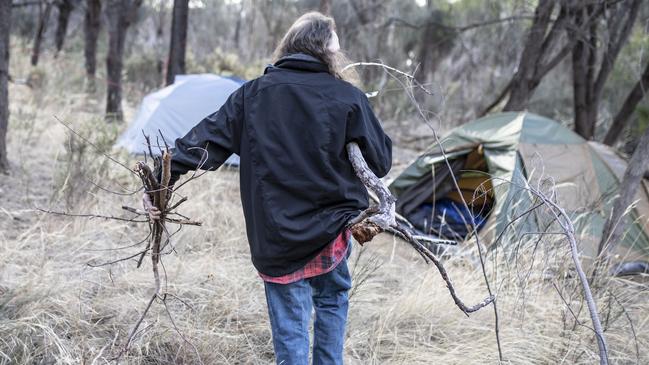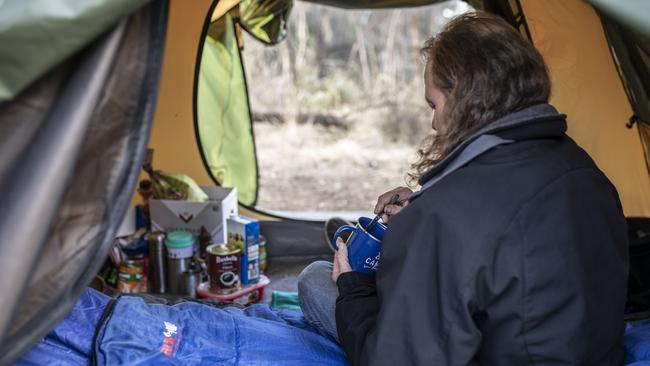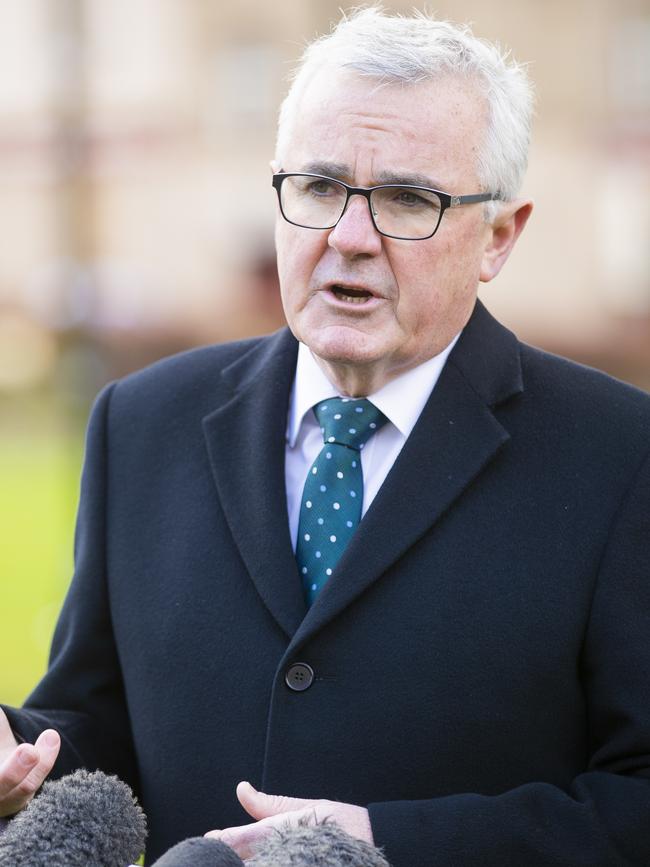‘I don’t feel as worthy as someone living in a house’
“A roof, four walls and a door.” That is what Scott misses most after sleeping in a tent for the past four months as a Federal MP calls on councils to free up space to house the homeless.

Lifestyle
Don't miss out on the headlines from Lifestyle. Followed categories will be added to My News.
SLEEPING rough makes you feel like you’re not a real person, says Scott — an unemployed former fruit picker and farmhand who now lives in a tent in Hobart’s suburban bushland.
He said living such a life made him feel less worthy than people who had a house.
“I don’t feel as worthy as someone who lives in a house, who has a 9-5 job and a partner,” Scott said.
Scott said he was forced into homelessness after his relationship of 10 years went sour.
After the break-up, he first lived under a tree in St David’s Park and then he couch-surfed. He said he had been on the public housing waiting list for two years and increased rents had forced him out of the rental market.
“My head is still back in those four walls and I really want to go back there, but I can’t and I have to live with that,” Scott said. “So I am waiting just like every other person on that housing list.”
MORE ON THE HOMELESSNESS CRISIS:
THEY JUST DON’T CARE, SAYS HICKEY
EDITORIAL: LET’S FIX THIS CRISIS … NOW
ACT FAST PLEA ON HOMELESSNESS CRISIS
Scott has been sleeping in a tent pitched in bushland on the outskirts of Hobart for the past four months.
He has a camp fire and a few cooking pots and pans and a 10-litre bottle of water.
He said although he mostly slept soundly on his air mattress snuggled under two sleeping bags, sometimes he felt unsafe.
“I miss having the security of a roof, four walls and a door,” he said.

He showers daily at the Richmond Fellowship drop-in centre in Patrick Street.
He also uses the facilities there to wash and dry his clothes and he helps to cook breakfast and lunch for other Tasmanians doing it tough.
“It’s great to be able to use the computers here and to have a shower because you feel horrible if you are not clean,” Scott said. “Helping with the food preparation gives me something to do during the day. It’s great to be able to talk with other people here. The social connection here is very important.”
The drop-in centre is designed for people with mental health issues but the woman who runs it, Amie Blyth, said the number of homeless people walking through the door had doubled in 12 months.
Scott said seeing many empty Hobart buildings was difficult for someone living rough. “It makes me feel annoyed because there are people who really need a roof over their heads,” he said.
We can already provide shelter
AN urgent audit of all vacant State and Local Government-owned buildings — including Hobart’s council offices — is needed to identify where Hobart’s homeless can sleep, Clark MP Andrew Wilkie says.
Mr Wilkie said homelessness in Hobart — a situation which sees about 120 people sleep on the streets each night — was at crisis point and must be dealt with immediately by Greater Hobart councils and the State Government.
A Tasmanian resident who said he had done recent work at the council’s Davey St offices told of two floors there that were going unused.

Mr Wilkie said the council, instead of proposing new ideas for tackling the growing homelessness issue, should “look under its own nose” and consider vacant space inside council-owned properties.
“We are hearing about whole floors inside the Hobart City Council building on Davey St that are going unused,” he said.
“It raises questions about what other unused spaces there are around Hobart that are state and local government-owned.”
Mr Wilkie said, while a longer-term solution was needed, temporary living arrangements at vacant city properties “just makes sense”.
“This is a council and State Government issue to fix. Our charities don’t have any responsibility to fix this, both tiers of government must act.
“I call on an audit of all state and local government property holdings to find out what is available and what is suitable.
“It may find some places aren’t suitable, but it may find that some are. In the short- term, we don’t need to be spending big money bringing interstate resources down.
Housing Minister Roger Jaensch, who Mr Wilkie yesterday labelled “just as useless as Health Minister Michael Ferguson”, said the only way to reduce homelessness was through building more homes”.
Hobart City Council general manager Nick Heath said all floors inside the council building were fully occupied except for some space on level four which was “about to be tenanted”.
“While we appreciate the seriousness of the homelessness issue, it is also not appropriate to simply pack homeless people into any space possible without due consideration,” he said.
“The June 20 council-operated forum [on the crisis] is not about the council coming up with solutions on its own but about bringing all the key service providers together to assist in finding solutions.”


